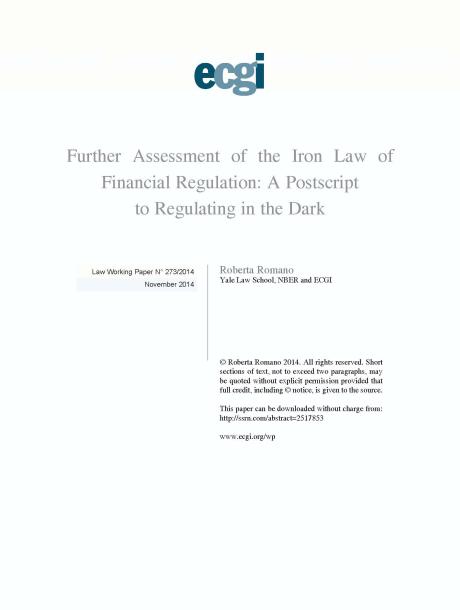
Further Assessment of the Iron Law of Financial Regulation: A Postscript to Regulating in the Dark
Abstract
In an earlier companion essay, Regulating in the Dark, I contended that there is a systemic pattern in major U.S. financial regulation: (i) enactment is invariably crisis driven, adopted at a time when there is a paucity of information regarding what has transpired, (ii) resulting in off-the-rack solutions often poorly fashioned to the problem at hand, (iii) with inevitable flaws given the dynamic uncertainty of financial markets, (iv) but arduous to revise or repeal because of the stickiness of the status quo in the U.S. political framework of checks and balances. This pattern constitutes an ?Iron Law? of U.S. financial regulation. The ensuing one-way regulatory ratchet generated by repeated financial crises has produced not only costly policy mistakes accompanied by unintended consequences but also a regulatory state whose cumulative regulatory impact produces over time an increasingly ineffective regulatory apparatus. This Postscript analyzes the experience with regulators? implementation of Dodd-Frank since the publication of the earlier essay. After a discussion of broad issues related to the statute and its implementation, the analysis focuses on two provisions by which Dodd-Frank exemplifies the difficulties that are created by legislative strategies conventionally adopted in crisis-driven legislation, off-the-rack solutions along with open-ended delegation to regulatory agencies as legislators, who perceive a political necessity to act quickly, adopt ready-to-go proposals offered by the policy entrepreneurs to whom they afford access: the Volcker rule, which prohibits banks? proprietary trading, and the creation of the Consumer Financial Protection Bureau. The analysis bolsters the original essay?s contention regarding the inherent flaws in major financial legislation and the corresponding benefit for improving decision-making that would be obtained from employing, as best practice, the legislative tools of sunsetting and experimentation to financial regulation. The use of those techniques, properly implemented, advances means-ends rationality, by
better coupling the two, and improves the quality of decision-making by providing a means for measuring and remedying regulatory errors.






